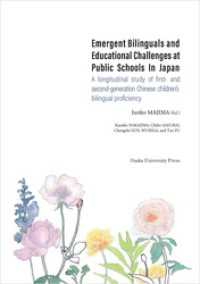- ホーム
- > 洋書
- > ドイツ書
- > Humanities, Arts & Music
- > History
- > miscellaneous
Full Description
The volume "The UNESCO Memory of the World Programme: Key Aspects and Recent Developments" responds to the growing interest in the scientific study of the Memory of the World Programme (MoW) and its core concept of documentary heritage, which has received little attention from scholarship so far.





![コミック百合姫 2018年5月号[雑誌]](../images/goods/ar2/web/eimgdata/EK-0529594.jpg)


